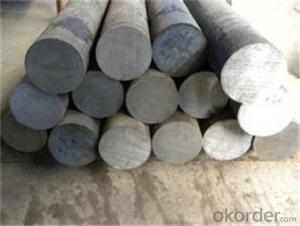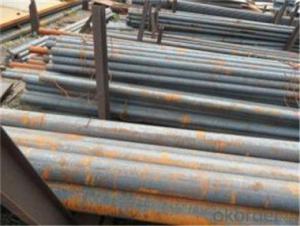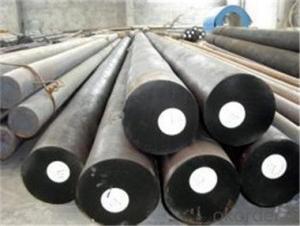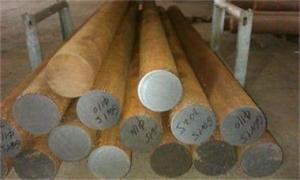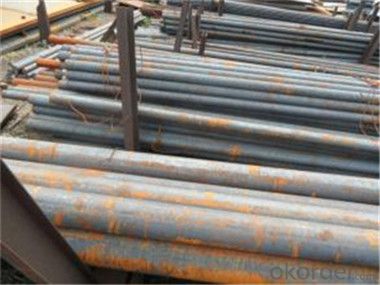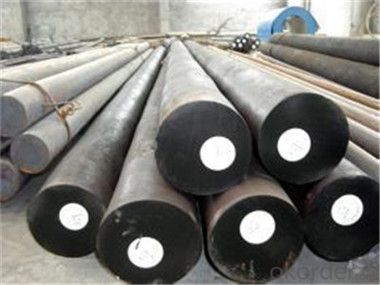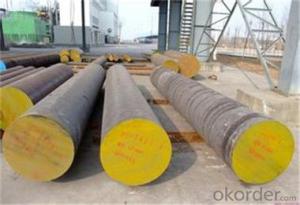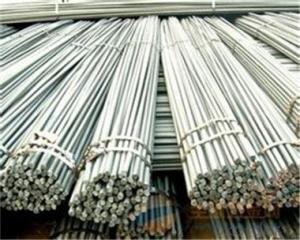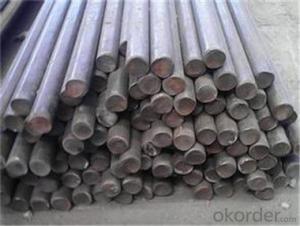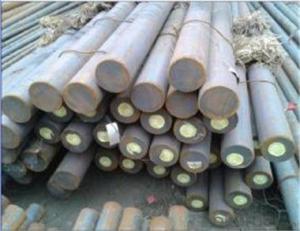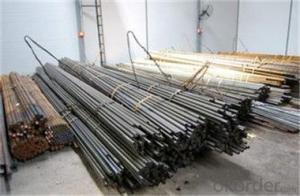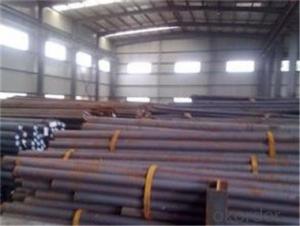Hot Rolled 12mm Steel Rod Price Steel Round Bars
- Loading Port:
- Tianjin
- Payment Terms:
- TT OR LC
- Min Order Qty:
- 33 m.t.
- Supply Capability:
- 2000000 m.t./month
OKorder Service Pledge
OKorder Financial Service
You Might Also Like
Description of steel round bar:
(1) Thickness of not more than 2MM sheet, efficient blanking die, punch die and pressure die etc.
(2) All kinds of scissors, inserts, woodworking blade.
(3) Thread rolling die and wear-resistant slider.
(4) Cold Heading Die, thermosetting resin molding.
(5) Molding in deep drawing cold extrusion dies. it has good strength and good comprehensive mechanical properties.The process is good.
Festures of steel round bar:
4340 Forged Round Steel Bar
1.Dia 80-800mm Length:2000-13000mm or as required
2.Technique:Forged
3.Delivery Time:45 days
Specifications of steel round bar:
Round bar | Diameter(mm) | Length (mm) | |
10~800 | 2000~5800 | ||
plate/sheet | Thickness(mm) | Width (mm) | Length (mm) |
10~800 | 80~2300 | 2000~5800
|
Images of steel round bar:
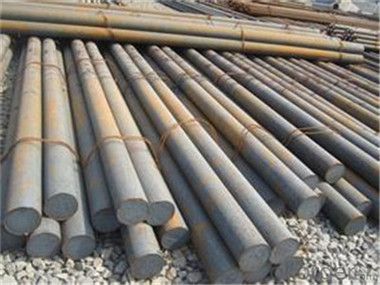
FAQ:
1. What is your package?
Packing situation: standard seaworthy packing or as customer required.
2. How long is the lead time?
Delivery time: 45 days after order confirmed.
3. What payment term do you accept?
Payment: T/T or L/C at sight.
- Q: Are steel round bars available in custom sizes?
- Indeed, one can find steel round bars in custom sizes. Steel manufacturers and suppliers have the capability to produce round bars according to precise size demands and specifications. It is possible to make requests for custom sizes based on the diameter, length, and overall dimensions of the round bar. Whether it is for a particular project or application, numerous steel manufacturers and suppliers provide the opportunity to tailor the size of round bars to cater to individual requirements.
- Q: Can steel round bars be used for making hydraulic systems?
- No, steel round bars are not suitable for making hydraulic systems as they lack the necessary properties like corrosion resistance and flexibility required for hydraulic applications.
- Q: What are the considerations for selecting the right steel grade for a round bar?
- There are various factors to consider when choosing the appropriate steel grade for a round bar. To begin with, the intended application of the round bar should be taken into account. Different steel grades possess distinct properties that make them suitable for specific purposes. For instance, stainless steel or high-alloy steel, which have exceptional heat resistance, would be ideal for use in high-temperature environments. Conversely, carbon steel, with its good strength and ductility, may be more appropriate for structural applications. Another factor to consider is the desired mechanical properties of the round bar, including tensile strength, yield strength, hardness, and toughness. These properties can vary significantly among different steel grades, so it is crucial to select a grade that meets the specific requirements of the application. Corrosion resistance is also an important consideration. If the round bar will be exposed to corrosive environments, such as in marine or chemical applications, it is advisable to choose a stainless steel grade with high resistance to corrosion. On the other hand, if corrosion resistance is not a major concern, a carbon steel grade may be more cost-effective. Cost is another factor to be taken into account. Different steel grades have varying costs based on availability, demand, and manufacturing processes. It is important to strike a balance between the desired properties of the round bar and the available budget to ensure cost-effectiveness. Moreover, the manufacturability of the steel grade should be considered. Some steel grades may be more challenging to machine or weld, which can impact the production process and cost. It is crucial to select a readily available steel grade that can be easily processed to meet the required specifications. Finally, it is always advisable to seek guidance from steel suppliers, engineers, or metallurgists to ensure that the chosen steel grade aligns with the specific requirements of the application. Their expertise and experience in the industry can provide valuable insights and recommendations.
- Q: What is the tensile strength of Q235 round steel?
- Nominal diameter 8-20 mm, yield point is greater than or equal to 235MPa, tensile strength greater than or equal to 370MPa, elongation is greater than or equal to 25%.
- Q: What are the different types of steel round bar surface coatings?
- Enhancing the performance and durability of steel round bars commonly involves utilizing various surface coatings. These coatings serve as a protective layer, safeguarding against corrosion and improving the overall appearance. Several types of surface coatings are frequently employed, including: 1. Galvanized Coating: This method entails applying a zinc layer to the steel round bar. It boasts exceptional corrosion resistance, making it ideal for outdoor applications that expose the steel to moisture and harsh environmental conditions. 2. Powder Coating: In this process, a dry powder is applied to the steel round bar and then cured under heat. The result is a robust and visually appealing finish that resists chipping, scratching, and fading. Powder coating offers a wide range of colors and textures, making it a popular choice for decorative purposes. 3. Epoxy Coating: An application of liquid thermosetting polymer, which subsequently cures to form a protective layer, characterizes epoxy coating. This type of coating exhibits excellent resistance to corrosion and chemicals, making it suitable for use in harsh environments. Industries such as oil and gas, marine, and chemical processing frequently employ epoxy coatings. 4. Chrome Plating: Chrome plating involves electroplating a chromium layer onto the steel round bar. This coating provides superior corrosion resistance and enhances the steel's appearance. Chrome plating is commonly utilized in applications where both corrosion protection and aesthetics are crucial, such as automotive parts and decorative hardware. 5. Nickel Plating: Similar to chrome plating, nickel plating involves electroplating a nickel layer onto the steel round bar. This coating offers exceptional corrosion resistance and is often utilized in applications where the steel is exposed to harsh chemicals or extreme temperatures. These examples only scratch the surface of the available options for steel round bar surface coatings. The choice of coating depends on the specific requirements of the application, including the desired level of corrosion resistance, chemical resistance, and aesthetic appeal. Selecting the appropriate coating based on the intended use of the steel round bar ensures optimal performance and longevity.
- Q: What are the advantages of using heat-resistant steel round bars?
- The advantages of using heat-resistant steel round bars include high thermal stability, excellent resistance to oxidation and corrosion at elevated temperatures, superior strength and toughness, and the ability to retain their mechanical properties even under extreme heat conditions. Heat-resistant steel round bars also have good dimensional stability, making them suitable for applications in high-temperature environments such as furnace components, heat exchangers, and power generation equipment.
- Q: Can steel round bars be used for tooling applications?
- Tooling applications can indeed utilize steel round bars. Steel, being a highly versatile material, possesses exceptional strength, durability, and resistance to wear and tear. By machining, heat treating, and shaping round bars made of steel, one can create a wide range of tools, including punches, dies, drills, and lathe tools. The round shape of these bars facilitates effortless machining and shaping processes. Moreover, the performance of steel round bars in specific tooling applications can be further enhanced through surface treatments or coatings. All in all, due to their outstanding mechanical properties and adaptability, steel round bars find widespread application in tooling.
- Q: What is the difference between hot-rolled and cold-rolled steel round bars?
- The manufacturing process is the primary factor that distinguishes hot-rolled and cold-rolled steel round bars, giving rise to distinct physical and mechanical properties. Hot-rolled steel round bars are formed by subjecting a billet or ingot to extremely high temperatures, usually above 1700°F (926°C). This allows the steel to become malleable and easily shaped. The process involves passing the heated steel through large rollers, which gradually decrease the diameter and increase the length. Consequently, hot-rolled bars have a rough, scaled surface with rounded edges. The rapid cooling that follows also creates an oxide layer or mill scale on the surface. In contrast, cold-rolled steel round bars are produced by rolling the steel at room temperature or slightly below. This method offers greater control over the dimensions and surface finish of the bars. The process entails passing the steel through smaller rollers, which exert high pressure to shape and compress the material. As a result, cold-rolled bars have a smoother and more precise surface finish, with sharper edges compared to their hot-rolled counterparts. Furthermore, since the steel is not subjected to high temperatures, it retains its strength and hardness properties. The differing manufacturing processes lead to variations in the mechanical properties of hot-rolled and cold-rolled steel round bars. Hot-rolled bars typically have a higher yield strength and are generally more ductile, making them suitable for applications that involve extensive shaping or bending. On the other hand, cold-rolled bars have a higher tensile strength and are generally harder, making them suitable for applications that require greater strength and dimensional accuracy. In conclusion, the key distinctions between hot-rolled and cold-rolled steel round bars arise from the manufacturing process, resulting in differences in surface finish, dimensional accuracy, and mechanical properties. The choice between the two depends on the specific requirements of the intended application.
- Q: What is the maximum titanium content allowed for steel round bars?
- The maximum titanium content allowed for steel round bars typically depends on the specific steel grade and composition. However, as a general guideline, the maximum titanium content in steel round bars is usually around 0.05-0.06%.
- Q: Can steel round bars be used in the construction of bridges?
- Absolutely, steel round bars are indeed suitable for the construction of bridges. Their exceptional strength, durability, and versatility make them a common choice in bridge construction. They possess remarkable load-bearing capabilities and can endure substantial weights, making them ideal for utilization in bridge beams, columns, and other structural components. Furthermore, steel round bars can be effortlessly welded, bent, and shaped into diverse forms and sizes, allowing for tailor-made designs and streamlined construction procedures. By employing steel round bars, the bridge guarantees both its structural soundness and long-lasting nature, which explains their widespread preference in bridge construction around the globe.
Send your message to us
Hot Rolled 12mm Steel Rod Price Steel Round Bars
- Loading Port:
- Tianjin
- Payment Terms:
- TT OR LC
- Min Order Qty:
- 33 m.t.
- Supply Capability:
- 2000000 m.t./month
OKorder Service Pledge
OKorder Financial Service
Similar products
Hot products
Hot Searches
Related keywords
